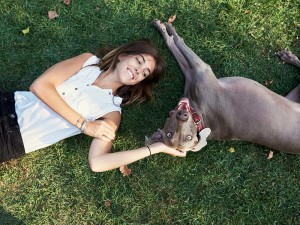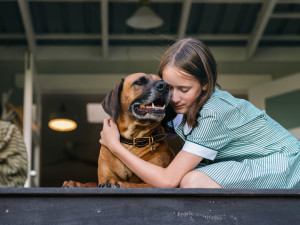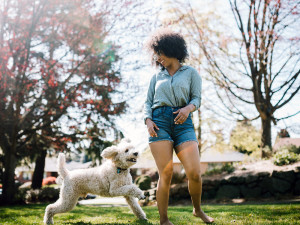Are Gamer Dogs on the Horizon?
Don’t just assume that your dog’s golden years should be spent quietly relaxing — they could be gaming.

Share Article
There is plenty of evidence that continued activity and social engagement with physical and/or mental exercise help maintain cognitive function in aging dogs. But, for many dogs, getting grey hairs might mean their people play with them a little less and do less training and walking either because of injury or under the misguided notion that old dogs just want to rest.
Studies show that people experiencing age-related mild cognitive impairment may improve their cognitive function with a memory game on an iPad. With that in mind, can the same be said for dogs? Find out how touchscreens might help provide opportunities for cognitive enrichment in old dogs.
Keeping Old Dogs Mentally Fit with Tech
One study explored the possibility that there are benefits of using touchscreen technology to help dogs stay happy and mentally sharp as they age. Researchers used touchscreens to offer dogs the opportunity to play games in which correct choices resulted in food rewards. Since dogs (and other animals that have been studied) find food even more rewarding if they have earned it rather than offered it for free, the idea has great potential to improve dogs’ quality of life and well-being.
The study, published along with other work on computer-animal interactions, also proposed that the system has the potential to improve the welfare of dogs — especially senior ones — through cognitive enrichment. Here’s how it worked:

Dogs in the study first had to be trained to touch the screen for a treat, then to touch it in a certain place, and finally to choose between options in order to be correct. Once that base level of training was accomplished, dogs could be introduced to more challenging cognitive tests.
The study was performed with 265 dogs (and 20 wolves) who were taught to use the touchscreens and demonstrated the potential of touchscreen games and puzzles to positively impact dogs of all ages, especially older dogs. Pet parents of the dogs in the study reported that their dogs became increasingly happy with each visit to the lab for training sessions and that the whole experience led to benefits in their everyday lives.
Mental Exercise is Good Exercise
Many of the dog’s pet parents in the study were surprised at how tired their dogs were after their cognitive training sessions and began to buy into the importance of mental exercise. The unintended result of this was that many of them invested time and effort into additional forms of cognitive work with their dogs. The additional enrichment was good for the dogs’ quality of life. Many pet parents became more engaged with their dogs and proud of their accomplishments, which improved the bond between people and their dogs. (This may be an effect of involvement in any sort of study and may not indicate that touchscreens, in particular, as a tool, lead to improved relationships.)
The study suggests that future work should explore the effects of touchscreens on dogs in specific ways: levels of cortisol (as a measure of stress) and dopamine (as a measure of motivation), the effects on the dog-human relationship, changes in learning ability and problem solving, and the emotional effects on dogs.
Potential Downsides to Dog Gamers
The researchers hope that their studies could lead to the development of commercial tablet games for dogs. The idea that touchscreens may help improve aging dogs’ cognitive function and well-being is intriguing, but there are concerns.
One issue is that people may rely on these tablets to occupy their dogs rather than interact with them directly.
Much like with humans, another problem may be that dogs could suffer the negative aspects of gaming — lack of exercise, addiction, and social isolation — especially if they are not used in moderation as the designers intended.
What do you think about touchscreen games for dogs?

Karen B. London, PhD, CAAB, CPDT-KA
Karen B. London is a certified applied animal behaviorist (CAAB) and certified professional dog trainer (CPDT) who specializes in working with dogs with serious behavioral issues, including aggression. She has written for a variety of magazines including The Bark, Clean Run, and the APDT Chronicle of the Dog, and has published in scientific journals including Behavioral Ecology and Sociobiology, Ethology, Ecology, and Evolution, the Journal of Insect Behavior, and Insectes Sociaux. She is the author of seven books about dog training and canine behavior, including the forthcoming My Dog's Mystery Adventure: And Other Stories From a Canine Behaviorist and Dog Trainer.
Related articles
![Woman laying on the grass smiling at her dog]()
10 Ways You Can Make Your Dog’s Life Better
Number 6 will probably surprise you.
![Young girl hugging an older dog on porch]()
How to Recognize and Treat Canine Dementia
Learn about the signs, symptoms, and treatments.
![A woman with curly black hair playing with her white labradoodle dog outside]()
7 Games That Can Actually Teach Your Dog Something
Cue the Schoolhouse Rock! because learning can be fun.
![Dog playing the shell game with her human. Concept of training pets, domestic dogs being smart and educated]()
4 Ways to Keep Your Dog Busy When They Can’t Exercise
Even if your dog is injured and can't exercise, you can still keep them entertained. Here's how.




